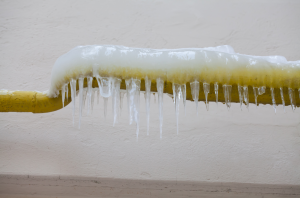 2021 is upon us and so is winter. In some parts winter has already reared its evil head. When winter hits your home really hard, is your plumbing ready for winter?
2021 is upon us and so is winter. In some parts winter has already reared its evil head. When winter hits your home really hard, is your plumbing ready for winter?
Winter weather and freezing temperature can be hard on all of your plumbing, both inside and out but if you take a few easy steps can help protect your plumbing.
1. FIX EXISTING PLUMBING LEAKS NOW
Leaks and cold freezing weather do not go together at all. In fact it is a recipe for disaster! Leaks, no matter the season, add to wasted water and added utility expenses, so address them as soon as they happen. Should the leaky area freeze in the winter, the water will expand. This increases the size of the leak and the amount of money you are going to need to spend to repair it.
2. OPEN YOUR CABINETS
When it is really cold outside, open the cabinets that hide your pipes, like the cabinets under your sink. This allows more heat from the home to flow to them, which can help to prevent freezing. This is particularly helpful for cabinets and pipes along exterior walls.
3. LET THE FAUCET SLOWLY DRIP
Before you go to bed, if the temperature is forecasted to dip below zero, turn on a faucet with pipes running along an exterior wall for a slow drip. The continuing flowing water reduces the risk of the pipe freezing. It also protects against burst pipes if the water does freeze, because it prevents pressure from building up between the faucet and an ice formation.
4. ADD PIPE INSULATION
Add pipe insulation on exposed pipes in your basement, along exterior walls, and outside your home. Wrap pipes in insulation tubes made from fiberglass or polyethylene to add a layer of protection against freezing. All unheated areas of your home that have pipes need pipe insulation on the pipes. It is also a good idea, when doing any renovations to insulate any pipes you are unable to easily get to.
5. DISCONNECT YOUR OUTDOOR PIPES
Disconnect outdoor pipes by loosening the hose and turning off the valve leading to the outdoor water spigot. We are talking inside your home, not the spigot. There should be a water shutoff inside for the outside spigot. This prevents water from running to the exterior lines, where it is more liable to freeze. It also eliminates the risk of water remaining in the hose from damaging the faucet. Store the hose indoors – like your shed so it does not suffer damage over the winter months.
6. SEAL OFF YOUR CRAWL SPACE
A ventilated crawl space is often a problem in the winter. Seal off crawl space vents with thick cardboard and duct tape. This will protect any pipes that run through the crawl space. In addition, seal the access to the crawl space to prevent cold air from entering the space. If you have a basement instead of a crawl space, inspect the windows to ensure they are not letting cold air in.
7. DRAIN YOUR WATER HEATER
Over time, hard water causes sediment buildup in the water heater. This sediment turns in to rust, which you could end up drinking or cooking with. As you prepare the home for winter, drain the water heater to remove some of the sediment. If you find that the water coming out is rusted, consider purchasing a new water heater before it gets too much colder. You need to know you have reliable hot water when the winter months hit.
At JPI Plumbing and Heating, Inc. getting your home and your plumbing systems ready for winter should not be hard, but it does require a little bit of attention. To make sure you’re getting everything right, consider partnering with the experts at JPI Plumbing and Heating, Inc. We’ve have the staff and the experience and also have high ratings from many a satisfied customer.
Call us today at 718-727-9100 to learn more about our JPI Plumbing and Heating, Inc.’s plumbing winterizing services.

